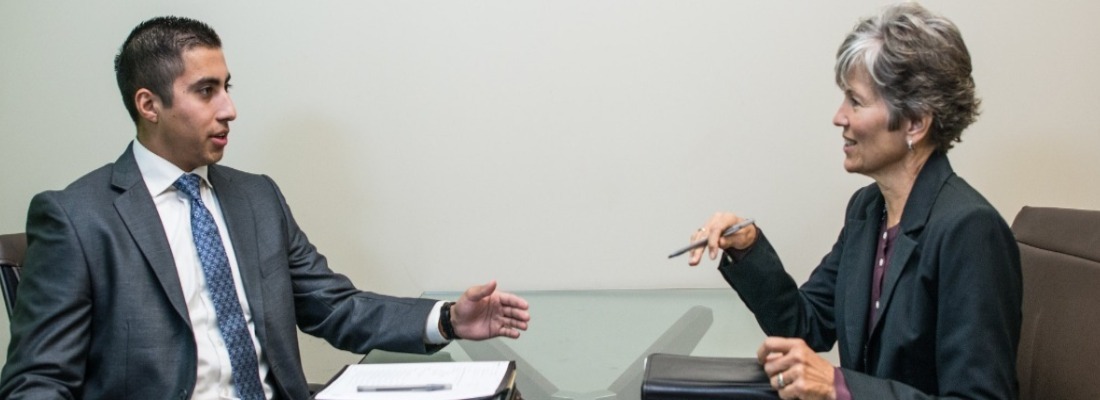Interviewing for a job is the final part of an often-complicated hiring process. It’s both the most important, but also the most difficult for employers and candidates. I have completed over 3,000 interviews in my working career with the average interview lasting around one hour.
As an interviewer, if you interview three candidates in a single session, by the time you’ve finished the third interview, it’s hard to remember what the first looked like, let alone whether they were any good.
First Impression
To be remembered, you need to make a good impression. A bad impression will make you stand out, but for all the wrong reasons.Standing out from the crowd will mean that the interviewer remembers you, however, how do you make sure this happens at each interview you go to? Below are my top tips to help you stand out in your next job interview.
Prepare for Your Job Interview
There is an old phrase that I remember from School – “Prepare or Prepare to Fail.” It’s very accurate when it comes to interviewing; however, you would be amazed how many people don’t bother doing any job preparation.
Before any interview, you need to take some time to research the company and find out all the information you can. You also need to make sure that you have adequately prepared yourself which could include everything from learning about mistakes candidate make during competency-based interviews to learning about simple candidate mistakes.
I always find it amazing when I ask the question “what do you know about my company,” and the candidate cannot put together more than a couple of words.
Stand Up and Shake the Interviewers Hand
As the interviewer walks into the room, stand-up and firmly shake their hand. First impressions do count, and while you can recover from a bad first 30 seconds, it can be difficult.In the same way that your CV needs to capture the attention of the hiring manager in the first 10 seconds, the first 30 seconds of your job interview is where hiring managers will make that initial impression on whether you’re suitable for their team.
Build Rapport with the Interviewer
Building rapport with someone you’ve just met is very difficult, but it’s a critical part of your job interview. By having only ten-minutes of chit-chat before your interview gets going, you will relax, relax the hiring manager and most importantly, get the hiring manager to like you as a person. Interviews are much more comfortable when the interviewer gets on well will with the candidate, than when I don’t.
To build rapport, you need to ask open-ended questions and should develop into a conversation. Unfortunately, rapport is not something you can create yourself; however, it is possible to stimulate a conversation if you’ve done your preparation correctly. Most people love to talk about themselves and hiring managers love to talk about their team and development. If you research your interviewer, it’s possible to find something to talk about that will help you build rapport. Maybe you attended the same school/college, had the same manager, worked with the same people, grew up close by or even support the same team.
All these small things will help you build rapport with the hiring manager and get your job interview off to the right start. If you need help building rapport, there’s a great article here that goes into more details.
Answer the Question
Nothing drives me crazier than a candidate that refuses to answer the question. Of course, there are times when you need to use examples with your answers, such as with a competency-based job interview, however, if you’re asked a direct question, you need to make sure that you provide an answer quickly.
Waffling is also not acceptable. If you need a few seconds to think of the right answer, take it. It’s much better to think for a minute and give to well thought out answer to a question, than waffling on and regretting it later.
Remember Body Language
Often, it’s not what you say, it’s how you say it that’s most important. Body language experts suggest that 55% of what we say doesn’t come out of our mouth and instead comes from our body language. It’s possible to answer every interview question correctly and still make a terrible impression. How? You get your body language wrong.
The short version to the correct body language for job interviews – Sit with your back straight, lent slightly forwards to indicate that you’re interested (reclining into your chair shows you’re bored or could be a sign of arrogance) and your hands slightly together. Don’t cross your arms as this could be a sign of a need for protection or nerves when you’re trying to show confidence. Please make sure you have eye contact with your interviewer without staring at them for long periods of time.
Use the SAR Method for Answering Question
It’s likely you will be asked competency-based interview questions as they’re becoming more and more common during the interview process. Competency-based questions use past performance to gauge how you would react to situations in the future and therefore whether you would fit into the company culture.
Competency-based interview questions are easy to spot as they will always start with the interviewer telling you to provide an example of a situation.The best way to answer any competency-based job interview question is to use the SAR method. The SAR method stands for Scenario, Action, and Result. When you’re asked a competency-based job interview question that needs an explanation, start off with the “Scenario” and describe in detail the situation that you faced. Follow this up with the “Action,” i.e., what action you took and end with the result.
Remember its critical to answering competency-based job interview questions correctly to create a true story. Do Not try and make a story up as you will fail when it comes to the detail.
No Such Thing as an Exact Match
There is no such thing as the perfect candidate for a specific job. The ideal candidate already has the perfect job and does not want to join.If the perfect candidate is out of the running for the job and you understand that hiring managers do not have time to waste by interviewing random candidates, you have as much chance of being successful as anyone else.
Over the years, I have met hundreds of candidates that thought they had no chance of being successful. They didn’t do any preparation and didn’t take the interview process seriously. They did, however, find out at the end of the interview process, they were the second favorite candidate. If only they had done some interview preparation and took the process seriously, the job could be there’s.
Never Lie or Bend the Truth
Recruiters are not stupid and don’t think you can pull the wool over our eyes. Honestly, every trick you can come up with, we have seen before and can see right through what you’re trying to do. If you’ve been sacked, tell us. If you’ve had difficulties in your job, let us know. Recruiters are here to help; however, the honesty starts with the candidate. Make sure you don’t lie or bend the truth as you will be found out.
Here’s a great example of a candidate bending the truth. Recently a candidate sent me a CV which looked great for a client, however, he had only been at is current company for three months which raised questions – Has he not got through his probation period?During the interview, the candidate explained that his present company was not doing well, and he would leave. The problem was that I knew through my network his manager and a simple reference check revealed the answer. The work was too complicated, and he could not do it. I have never spoken to him again.
Follow UP
Standing out in your job interview for the right reasons is not difficult as long as you use some basic common sense.
Prepare for your job interview and learn from your mistakes. We have all made a mess of a few job interviews in the past, and if you learn from your mistakes, it should not be a concern.
Nick Jones
Latest posts by Nick Jones (see all)
- What Job Should I Do? It Depends on Whether You’re An Introvert Or An Extrovert - November 17, 2021
- Ten Ways to Unplug and Recharge During The Holiday Season - November 3, 2021
- 10 Jobs for Teenagers to Earn Extra Money - October 13, 2021








